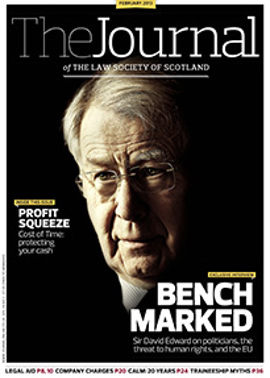Opinion column: Tim Haddow
At its March meeting, the Council of the Law Society of Scotland is likely to consider a paper to be prepared by the Campaign for Fair Access to the Legal Profession (CFALP), the Scottish Young Lawyers’ Association (SYLA) and the Trainee and Newly Qualified Society (TANQ).
The paper will call for the adoption of an explicit policy that the profession should be equally open to all, regardless of personal or family financial resources. And it will urge action to address the biggest financial obstacle faced by aspiring lawyers: funding the Diploma in Professional Legal Practice (DPLP).
When the DPLP was introduced as a bridge from academic study to the profession, its fees were covered by a Government grant. A further, means-tested grant was available for living costs. Today, the fees contribution (now a loan) is capped at £3,400 – half the cost of the course – while the maintenance grant dwindled to insignificance and was then scrapped.
DPLP students must now find more than £10,000 to fund fees and living costs. And for many, this comes with the risk they will be among the 25% who subsequently fail to obtain a training contract, an unpalatable gamble for those with limited financial security.
What started as a bridge for all is now a barrier for many.
But why should the profession commit to reform of the DPLP for the sake of fair access?
For business reasons alone, fair access makes sense. Artificial limits on the pool of talent mean that law firms lose talented graduates to other professions. Equally, lack of diversity stifles innovation and hinders a broad understanding of the varied needs of clients or customers.
But the special role of law within society gives a more fundamental imperative to fair access. Our civil and criminal justice systems must balance the needs, interests and rights of all. But any system is shaped by the character, nature and experiences of those operating it.
This is most explicit in the need for a diverse and representative judiciary. But for most, the face of the law is not a judge, but a solicitor who can effectively advise and represent them. If our legal system, and justice itself, is to be accessible, the profession at all levels must understand the needs and win the trust of every section of society. To do this, it must better reflect those it seeks to serve.
One approach to the financial hurdles faced by law graduates is to argue for better Government support for DPLP students.
But it is the profession, not Government, that defines the route to qualification. And while the profession has an important public role, it is predominantly in private practice. So it is legitimate for society to ask whether the public purse should be the guarantor of fair access indefinitely, even if Government can be persuaded to fulfil this role in the short term.
For this reason, further reform of the route to qualification is needed. Some may argue that the recent Professional Education and Training (PEAT) changes need time to settle. But PEAT did not alter the fundamental structure of the DPLP and training contract.
Further reform does not mean PEAT was wasted. On the contrary, PEAT foreshadows a more integrated approach by treating the DPLP and training contract as a single process. And the clearly documented PEAT outcomes provide an essential starting point for new models of education and training.
Nonetheless, there will be no easy answers. Any solution must win the support of law firms – small and large – other legal employers, and new and existing training providers. It must be economically viable, and produce the right number of newly qualified solicitors to meet demand. And the end result must be solicitors ready and able to meet the exacting standards of competence, conduct and service on which the profession rightly insists.
Developing and implementing a route (or routes) to qualification that delivers all this while also enshrining fair access will require leadership, imagination and perseverance.
March’s meeting will provide an opportunity for the Law Society of Scotland to make this commitment clear, and to begin to turn that commitment into reality. All who wish to see a legal profession better equipped to deliver a representative legal system, and a fairer and more just society, should encourage and support Council in rising to this challenge.
In this issue
- Know your protection
- The Journal Annual Index 2012
- Rights around corroboration
- Cadder and common law fairness
- Age-old questions
- Master your mail
- Reading for pleasure
- A simple guide to arbitration for non-contentious lawyers
- Opinion column: Tim Haddow
- Book reviews
- Profile
- President's column
- Legal aid: another look
- Early warning system...
- Holding back the state
- It's all about cash...
- Charges changing
- Keep CALM and carry on
- Getting in quick
- Views of children
- More change. Less law?
- Forward, though I canna see...
- Scottish Solicitors' Discipline Tribunal
- Bankers: a breed apart?
- Ruaig an Fhèidh: 3
- The other alternative
- Risk refresher
- Ask Ash
- Law reform roundup
- Judge's conflict of interest warning
- How not to win business: a guide for professionals
- From the Brussels office
- Sent in error






